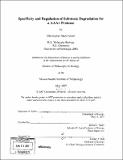Specificity and regulation of substrate degradation for a AAA+ protease
Author(s)
Farrell, Christopher Mark
DownloadFull printable version (5.033Mb)
Other Contributors
Massachusetts Institute of Technology. Dept. of Biology.
Advisor
Robert T. Sauer.
Terms of use
Metadata
Show full item recordAbstract
Energy dependent proteolysis is a critical method of cellular regulation for all forms of life. The AAA+ proteases ClpXP and ClpAP in E. coli function in this capacity by facilitating the denaturation and degradation of target substrates. These proteolytic enzymes degrade hundreds of different proteins. Determining how the activities of these proteases are regulated in the cell as well as learning how these enzymes bind and engage substrates are important goals. In order to better understand how the degradation of ClpXP and ClpAP is regulated, I studied their contributions to ssrA-tagged protein degradation in the cell. Using GFP-ssrA expressed from the chromosome as a degradation reporter, the effects of altered concentrations of different protease components or adaptor proteins were explored. I found that both ClpXP and ClpAP could degrade GFP-ssrA in the cell and that increased levels of ClpAP in stationary phase resulted in increased degradation of ssrA-tagged substrates. I also demonstrated that wild-type levels of the adaptor proteins SspB and ClpS do not fully inhibit ClpAP degradation of GFP-ssrA. To better understand how the ClpXP enzyme binds substrates, I took a mutagenic approach. (cont.) The "RKH" loops surround the entrance to the central pore of the ClpX hexamer and are highly conserved in the ClpX subfamily of AAA+ ATPases. I discovered that a mutation within the RKH loop of ClpX changes substrate specificity by 300-fold, resulting in decreased degradation of ssrA-tagged substrates but improved degradation of proteins with other classes of degradation signals. My results show that the RKH loops recognize the C-terminal carboxylate of the ssrA tag and suggest that ClpX specificity represents an evolutionary compromise that has optimized degradation of multiple types of substrates rather than any single class.
Description
Thesis (Ph. D.)--Massachusetts Institute of Technology, Dept. of Biology, 2007. Includes bibliographical references.
Date issued
2007Department
Massachusetts Institute of Technology. Department of BiologyPublisher
Massachusetts Institute of Technology
Keywords
Biology.